#CLASSICFILMREADING: GINGER: MY STORY BY GINGER ROGERS
Buckle up your dancing shoes: we're reviewing Ginger Rogers's autobiography today!
This is my third review for the 2022 Classic Film Reading Challenge, and I have to say that I'm having a blast reading this summer so far. My reviews for June Allyson's and Loretta Young's memoirs are here and here.
I've always known Ginger; her name is ubiquitous with old Hollywood and she's probably one of the lasting stars of that era. But her name is attached to a set. Fred and Ginger. Chances are if she's known by regular people, it's because of the string of smash-hit dancing movies she made with Fred Astaire in the '30s.
I wish I could remember where I heard this because it's stuck with me for a while, that Ginger Rogers was the everywoman back in those days. Where Bette Davis and Katharine Hepburn became known for the poised and polished characters (and sometimes scenery-chewing acting), Ginger was out there playing the broke women in search of a job; the ladies with the unrefined accents; the women who weren't necessarily looking for love, they were looking for a break. She might've looked nice in those dresses, but you never doubted that her characters were fully realized, and that's what made her so identifiable to audiences.
And that's where Ginger set out when writing her autobiography in 1991. To tell her story and only her story. And this is her story, goddammit. Every last sentence is written with that characteristic everywoman sensibility that she carried with her on screen and on stage. You never doubt for a second that Ginger had the agency to live a life she wanted, and reflecting back on her storied life and career as the curtain was beginning to close (she died in 1995), you get the feeling that writing this was one more bow, one more curtain call.
The ostrich feather dress from Top Hat caused a serious fight between Fred and Ginger and Ginger and the director. She was willing to walk off the production to wear it; everyone else wanted the white dress from The Gay Divorcee. A few days after they filmed the scene, a package showed up at Ginger's dressing room with a gold feather charm and a note that read "Dear Feathers. I love ya! Fred."
Fred wanted to avoid typecasting with Ginger, since he'd already experienced it with his old dance partner/sister Adele. Ginger didn't see a problem because she could make movies without him. "For every film I did with Fred Astaire, I did three to four without him. Our partnership was a limited one only in his case, not in mine. Fred didn't have this luxury; he was a musical comedy star, period."
Ginger took the titular role in Kitty Foyle after the script was re-written to exclude the racier bits from the novel. "I realized it was one hell of a script, and was convinced that whoever played the role would end up with an Oscar. I saw it that vividly. (Sorry, Olivia, you didn't get this one! Olivia de Havilland landed some very good roles that I turned down.)" It's one heck of a performance, and considering who she was up against on Oscar night (Katharine, Bette, Joan Fontaine and Martha Scott), that in and of itself was a feat!
From there, Ginger outlines how she continued to chose dramatic roles, how she stuck to her personal guns (she was a card-carrying Republican who called out communism and preached Christian Science...there's a lot of sermonizing about Christian Science in this book), and how she transitioned from box office queen to Queen Mother of Hollywood.
And through it all, I couldn't help but think how much of a trailblazer Ginger had been.
This might sound cheesy, too, but whatever, I'm in a sharing mood: whenever I'm feeling low or unvalued I think to myself, "Ginger Rogers did everything Fred Astaire did, only backwards and in high heels," and suddenly I'm motivated again. There are a million pithy quotes I could choose from, but it always comes back to Ginger.
And of course I can't resist some backstage gossip, and Ginger likes to gab, so enjoy:
- Rudy Vallee once wrote that Ginger proposed to him on the set of Campus Sweethearts, which Ginger says never happened. She even confronted him about it years later but he stuck to the story.
- Ginger might've been a Ziegfeld girl but Al Jolson wanted his new lady (Ruby Keeler) to play the part so she wasn't cast.
- RKO delayed production on Flying Down to Rio long enough that Fred's first dance partner wasn't Ginger, it was Joan Crawford.
- Joan Fontaine refused to take acting lessons from Lela (who offered them to newbies on the RKO lot). "Lela Rogers, you can't teach me anything," Ginger wrote. Joan later invited Lela to the premiere of Rebecca and Lela admitted, "You know, that kid certainly knew what she was talking about. What a talent. She certainly didn't need me. All she needed was Hitchcock!"
- Lela insisted that RKO keep Lucille Ball's contract.
- Cary Grant was the one that got away.
- Kept her dye job for Primrose Path a secret until the movie premiered. Walter Plunkett made her a turban to wear for the LA premiere of Gone with the Wind, which is how she kept it secret.
- Turned down Donna Reed's role in It's a Wonderful Life because she thought Mary Bailey was bland. "Foolish, you say?"
- She turned down To Each His Own because she didn't want to play the mother of a 27-year-old. Olivia won an Oscar for it. She also turned down The Snake Pit in 1948, which Olivia was nominated for. "Perhaps Olivia should thank me for such poor judgement."
- Wanted desperately to make Now, Voyager because Bette was in a contract dispute with Warner Bros and was on suspension. When the rumour mill hit Bette that Ginger was sniffing around the script, she went back to work and made the film.
- Tried to convince Leland Hayward to take on Van Johnson when he was still a chorus performer on Broadway. Leland didn't listen and later Warner Bros/MGM snatched him up. Van told Ginger that when they learned she was in the audience, "we danced our little hearts out."
- David Niven showed up to her ranch in Oregon a day early when it was only Lela there. They went out fishing together and David 'saved her' when she fell in. "She would have been down to the Pacific by now..." he told Ginger when she arrived the next day.
- Had a "quirky relationship" with Judy Garland because they'd always try to be friendly but something always went amiss.
- Wanted to have lunch with Judy while in London in the late '60s but her husband Mickey Deans, wouldn't let her. Judy was dead not long after.
- Wanted to go to Paris for the first time and called Cary Grant to help with the itinerary. This was 1952. They were considering rekindling their romance but alas, Ginger met Jacques and made her choice. Their friendship was permanently altered by this. "Whenever we met after that, Cary greeted me as one who might start whistling an old tune, only half-remembered."
- Met Rock Hudson in Rome and imitated the tourists in Italy while he recorded one of his famous home movies.
- Cary Grant, Jimmy Stewart and Dennis Morgan all rated a ten on her (literal) dance card.
- Made The Confession as a gift to her husband, but it was a terrible movie that cost her friendship with Ray Milland (which, as a huge fan of The Major and the Minor, was devastating to hear).
- Was going to present Fred with a lifetime achievement award in the '70s after being introduced by Gene Kelly. He then grabbed the medal out of her hand and said, "If you think you're going to give this medal to Fred, you're crazy!" then read her lines and handed it to him. Fred looked at her puzzled and Ginger wrote that she doesn't know who gave him permission to do that, "Does anyone out there know?" So long story short, now I hate Gene Kelly.
Other fun tidbits I learned about Ginger Rogers:
- She wanted her stage name to be Kendall Cortland. Wanger said "We hired you because your personality suited your name and vice versa."
- Ginger refuses to swear. Instead of using the f-word she writes "**BLANKETY-BLANK @@:#@%0:**!!!!THING!!!" which must've been fun to mash out on a typewriter.
- I love the way she describes sea air: "melon-like odor that comes from the strange combination of seaweed and salt water."
- 'Ginger snaps' was the prevailing pithy headline about Ginger's personality and movies.
- Ginger served as the inspiration for how shampoo commercials were filmed by figuring out how to create a convincing lather.
- In 1936 she was made a woman admiral of the Texas Navy by the Governor (Allred). "I never knew Texas had a Navy. So let's see a little respect--salute me, on the street or anywhere--but salute me, you'all!"
- They dyed Ginger's hair blonde without telling her the plan (she'd had chestnut hair prior). She ran out, called Lela, they threatened to sue, but then Ginger grew to love her blonde hair and the rest is history.
- In the '60s began turning down scripts because they were "too permissive in their dialogue and scenes. Hollywood was going in a whole different direction, one I didn't want to follow." So she turned to the stage after her last movie, Harlow, in 1965.
- 1967, she and Fred made a surprise appearance at the Oscars. She had to tell Hermes Pan to talk Fred into doing the impromptu dance they perform coming out. \
- Ginger never made another movie because by the '80s and '90s she thought a lot of movies had "raw and rough language or a tawdry and worthless plot or unnecessary violence." One film she did like? Dances With Wolves, that Kevin Costner...classic.
- July 23, 1964 was Ginger Rogers Day in Independence, Missouri.
- Ginger was in the last RKO film: The First Travelling Saleslady in 1956.
- The Major and the Minor was one of her favourite films.
Ultimately, if you're a fan of Ginger Rogers, you'll love this story of a plucky young woman who picked herself up and danced her way into Hollywood history and did it on her own terms. And if you're not already a fan of Ginger Rogers, I think you will be by the time you finish this book. I can't recommend this book or Ginger's filmography enough.

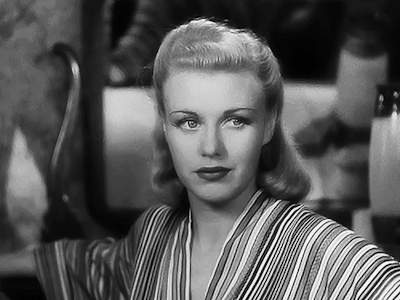
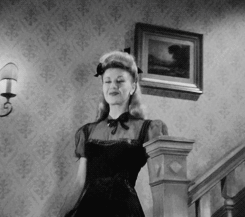
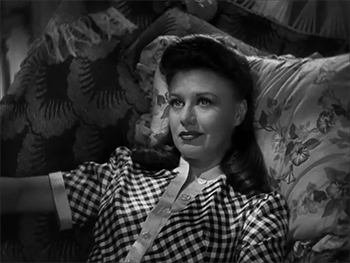
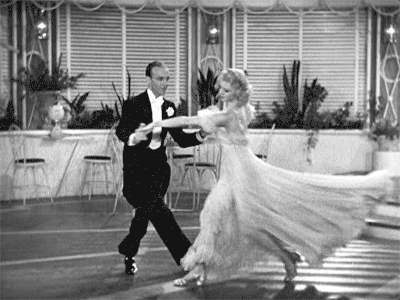
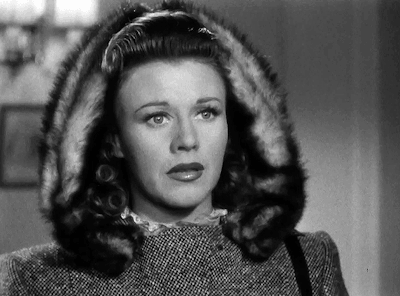
I love that you share all the juicy tidbits! I didn't know about her relationship with Cary Grant. Also now I won't look at Gene Kelly the same way. I really like that assessment of GInger Rogers being an everywoman. That's really spot on! Thank you for your wonderful review!
ReplyDelete